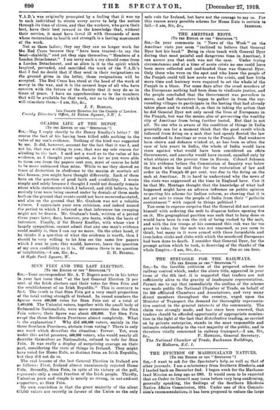THE AMRITSAR RIOTS.
[To THE EDITOR OF THE " SPECFATOR."] Stn,—In your comments in " News of the Week" on the Amritsar riots you seem "inclined to believe that General Dyer lost his head." Being in close touch with General Dyer during that most painful and dangerous time in Amritsar, I can assure you that such was not the case. Under trying circumstances and at a time of acute crisis no one could have been more collected and cool-headed than was General Dyer. Only those who were on the spot and who knew the people of the Punjab could tell how acute was the crisis, and how little more time and leniency were required to set the whole'of the Punjab in a blaze. For some days after the cruel murders of the Europeans nothing had been done to vindicate justice, and the people concluded that the Government was powerless to move, and bad characters began to gather in from the sur- roundittg villages to participate in the looting that had already taken place and to extend it, so that in taking the action that he did General Dyer not only saved the lives of Europeans in the Punjab, but was the means.also of preserving the wealthy city of Amritsar from being further looted. But that is not all. No one who is aware of the condition of things in India generally can for a moment think that the good result which followed from firing on a mob that had openly flouted the law was confined to Amritsar or even to the Punjab. Had weakness been shown and defiance winked at, as has been so often the case of late years in India, the whole of India would have risen against what would have been considered an effete Government, and anarchy would have ensued, equalled only by what obtains at the present time in Russia. Colonel Johnson in his evidence before the Commission of Inquiry was below the mark when he said that for the restoration of law and order in the Punjab 60 per cent. was due to the firing on the mob at Amritsar. It is hard to understand why the news of the riots was suppressed at the time in England here. Can it be that Mr. Montagu thought that the knowledge of what had happened might have an adverse influence on public opinion respecting his scheme for Indian reform, as showing that it is. not yet safe to rouse the people of India from their " pathetic contentment " with regard to things political ?
You seem to express surprise that the General did not content himself with ordering the mob to disperse before opening fire on it. His geographical position was such that to have done so would have been to run the risk of being rushed by the mob, and with the few troops at his command this risk was far too great to take; for the mob was not unarmed, as you seem to think, but many in it were armed with those formidable and iron-laden sticks and clubs with which the murdered Europeans had been done to death. I consider that General Dyer, for the prompt action which he took, is deserving of the thanks of the


























 Previous page
Previous page